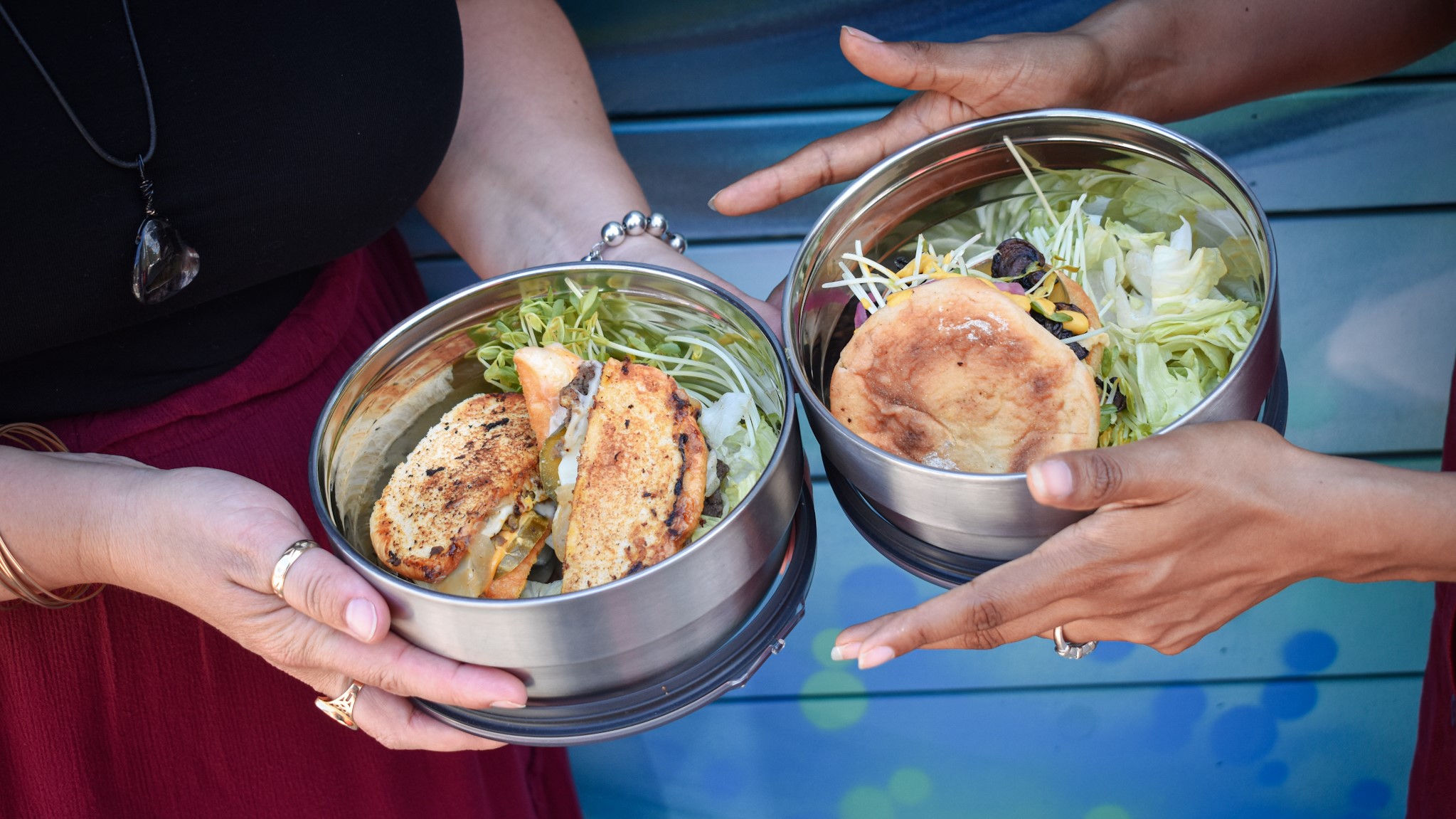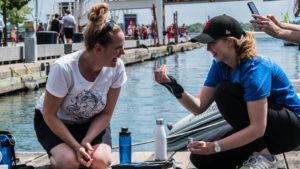
Circular economy entrepreneurs are closing the loop on waste
To some, “circular economy” is just another sustainability buzzword. But to many cleantech entrepreneurs, the circular economy is a guiding principle that can transform every industry, improve our quality of life, and increase profits – all while addressing climate change.
We spoke to five ventures from Earth Tech, an accelerator led by our partners at Climate Ventures, about how they’re finding value in preventing waste and modelling new ways of doing business. Bullfrog supports Earth Tech through our community projects grant.
- Anastasia Kiku is Co-Founder and COO of Reusables.com, a packaging-as-service platform that helps food businesses eliminate waste while preserving convenience.
- Karl Neubert is Director and VP of Marketing at Renewable Resource Recovery Corp. (R3C), a licenser of disruptive technology to replace fossil fuels for heating and cooling.
- Osayuki Osazuwa is Co-Founder and CEO of Jeosal Materials, a developer of economically viable and ecologically sustainable recycling solutions.
- Erika Reyes is Founder and CEO of Inwit Solutions Inc., a venture that inspires Torontonians to take climate action by enjoying waste-free takeout (pictured above).
- Ben Wiper is Founder and CEO of 3F Waste Recovery, a startup that produces high-value ingredients from fish, farm, and forest by-products.
What’s a circular economy?
Most businesses today use a linear model that can be described as “take, make, and waste.” A circular approach to doing business involves taking fewer resources from the environment, making more useful, longer-lasting products, and wasting nothing.
For Erika Reyes, the circular economy is the answer to climate change. “The circular economy is about redesigning our society around a philosophy of taking only what we need today without compromising the needs of future generations. We need to design products creatively so that they use existing materials and can become other products after end-of-life. Ultimately, for me, a circular economy means hope for the future.”
The circular economy is about redesigning our society around a philosophy of taking only what we need today without compromising the needs of future generations.
Ben Wiper compares a circular economy to natural processes. “For too long we’ve been trying to go against the flow of nature in our manufacturing processes,” he said, “and we’ve been fooling ourselves if we think we’ve been successfully forcing nature to adapt to us. It’s time to adapt our ways to nature.”
Shifting our cultural mindset away from linear, wasteful practices and towards circular models is a massive undertaking, but the benefits are well worth it. In addition to preserving natural resources and combating climate change, the economy stands to benefit from circular business models.
Research by Accenture reveals that the circular economy could generate USD 4.5 trillion of additional economic output by 2030, and as much as USD 25 trillion by 2050. Those who are stuck in their ways will miss out on the innovation opportunities that come with circular practices like repurposing waste, repair and remanufacturing, sharing, and more.
There are many ways to close the loop
Many practices can contribute to a circular economy, including sourcing used, recycled, or unwanted materials, designing quality products with longer lifespans, sharing or refurbishing existing products, and ensuring that all materials can return to natural cycles or the supply chain.
Jeosal Materials is working on the ‘recycling’ aspect of a closed-loop system. They recycle fibre-reinforced plastics from sources like decommissioned wind turbine blades and derelict marine vessels. By diverting these materials from landfill, they provide recovered fibres and resin powder for applications like water treatment, energy storage, and composite products.
 “The circular economy model is a win for the environment, which is beneficial to everyone,” said Osayuki Osazuwa. “Using recycled materials instead of virgin glass fibres can reduce carbon emissions by 378 kg per tonne of composite waste.”
“The circular economy model is a win for the environment, which is beneficial to everyone,” said Osayuki Osazuwa. “Using recycled materials instead of virgin glass fibres can reduce carbon emissions by 378 kg per tonne of composite waste.”
Reusables.com and Inwit’s products focus on the ‘sharing’ aspect of the circular economy by distributing reusable containers among food businesses and consumers. “Having this shared model allows us to invest in quality assets and create a premium takeout experience which is not viable for food businesses doing it individually,” noted Anastasia Kiku. Premium takeout containers are good examples of how circular principles can lead to better customer experiences and increased brand loyalty.
R3C and 3F Waste Recovery are devoted to adding value to outputs that would otherwise be considered waste. For example, 3F uses Atlantic cod by-products to produce pet treats, collagen powder, and more.
R3C’s technology helps building owners capture energy from their water pipes, store it, and then recover it when the building needs that heat. “Users of our system can both consume and produce their own thermal energy without fossil fuels,” Karl Neubert said. “This self-sufficiency eliminates the transportation and burning of fossil fuels and creates a new revenue stream for infrastructure owners.”
As these startups know, the circular economy has as many benefits as there are approaches. Improved product quality and user experience, new revenue streams, and reduced environmental impact are just some of the advantages that are drawing in entrepreneurs.
How can we veer off the straight and narrow?

Embracing circularity isn’t without its challenges. Anastasia noted that the current, linear system is cheap because it doesn’t account for environmental impacts and the costs that result. To level the playing field, she calls for systems that incentivise keeping materials in use for longer.
Ben laments that regulations and policies aren’t ready for waste to become a commodity. He believes that a lack of awareness about circular principles is holding many companies, governments, and investors back. Osayuki agreed that we need better government regulations. He pointed to Europe, which has implemented strict regulations against landfilling and deadlines to attain certain levels of circularity.
Karl and Erika have also found that lack of awareness can be a barrier to success. “In a society where our waste disappears magically and effortlessly, it may seem inconvenient to return your containers. However, at a macro level, generating waste causes many unseen issues, such as plastic pollution, health impacts, and land use for waste management,” Erika said. Both Karl and Erika devote significant time and resources to educating the public about circular principles.
Despite these challenges, the five entrepreneurs agreed that circular practices are within our grasp – as long as we can shift our mindset. Today we use phrases like “throw away” and “generate waste” as the default for end-of-life products. The circular economy invites us to recognize that there is no “end” in end-of-life, and that waste from one product can be the foundation for something valuable and new.
Earth Tech is led by Climate Ventures, an initiative of SI Canada and Foresight Canada. Earth Tech is made possible through the generous support of the RBC Foundation, the Peter Gilgan Foundation, and Bullfrog Power.

